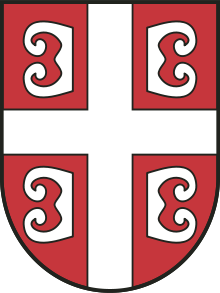Argentines of Serb descent
| Total population | |
|---|---|
|
(5,000 (2010)[1] 50,000 (est.)) | |
| Regions with significant populations | |
| mostly Buenos Aires province and Chaco province | |
| Languages | |
| Argentine Spanish, Serbian | |
| Religion | |
| Serbian Orthodox Church and Roman Catholicism | |
| Related ethnic groups | |
| European Argentine |
| Part of a series of articles on |
| Serbs |
|---|
 |
|
Native communities |
|
Related people |
Serbian Argentines or Serb Argentines refers to Argentine citizens of ethnic Serb descent or a Serbia-born person who resides in Argentina.
Although today Serbia and Montenegro are different countries, it is difficult to account separately the immigration flow from each of them, since the majority declares as Serbs.[2] There are about 30 000 people of Serbian and Montenegrin origin living in Republic of Argentina today. They mostly originate from the territories of today’s Montenegro and Croatia (Dalmatia), and, to a lesser extent, from Serbia and Bosnia and Herzegovina. Emigration in Argentina, despite the same origin as the one in North America, has developed distinguishing social and cultural character.[3] They live in different regions of Argentina, but mostly in the provinces Chaco, Buenos Aires and Santa Fe.
The research (Ethnographic Institute of the SASA) demonstrated that this diaspora is very much emotionally bounded to its ethnic origin, even though they are greatly assimilated. They are frequently unable to clearly define their ethnic identity, and thus a great number of them use the term “our” to refer to their origin, language,culture, and community.[4] Anyway, members of this diaspora consider themselves both as an integral part of Serbian people and loyal citizens of Argentina.[4] Only a small number of immigrants descedants use Serbian language.[5]
Some of homeland clubs, founded by first generations of emigrants in late 19th and early 20th century are still active and represent places where emigrants and their descendants gather. As much as modern life allows them nowadays, this diaspora make efforts to gather at homeland clubs to satisfy specific cultural needs.[6] It is important to mention that Serbian Orthodox Church also plays important role of these people, it's usually their connection with the spiritual and cultural heritage.[7]
Notable people
- -Expatriates
- Milan Stojadinović, Serbian politician, emigrated to Argentina in the 1940s
- -By descent
- Capitanich Popovich Jorge, Argentinian politician[8]
- Geraldine Zivic, Colombian actress born in Argentina
- Miguel Avramovic, rugby player
- Paola Vukojicic, field hockey goalkeeper
- Marcelo Burzac, football player [9]
Annotations
- Argentinian Serbs (Аргентински Срби) or Serbs in Argentina (Срби у Аргентини)
References
- ↑ Migration Profile of the Republic of Serbia
- ↑ "Serbia y Montenegrina". Buenos Aires Ciudad - Gobierno de la Ciudad Autónoma de Buenos Aires. Retrieved 2016-04-08.
- ↑ Stefanovic-Banovic, Milesa; Pantovic, Branislav. "'Our' diaspora in Argentina: Historical overview and preliminary research". Glasnik Etnografskog instituta. 61 (1): 119–131. doi:10.2298/gei1301119s.
- 1 2 "In Between Everyday Life and Nostalgia (Emigrants from Serbia and Montenegro in Argentina)". www.academia.edu. Retrieved 2016-04-08.
- ↑ Stojović, G.; Miljić, M. (2012). Crnogorci u Južnoj Americi. Podgorica: Centar za iseljenike Crne Gore.
- ↑ Бранислав Пантовић, Милеса Стефановић Бановић (2013). "ДОМОВИНСКИ КЛУБОВИ И УДРУЖЕЊА НАшИХ ИСЕљЕНИКА У АРГЕНТИНИ" (PDF). Гласник Етнографског музеја, књ. 78.
- ↑ Бранислав Пантовић, Милеса Стефановић-Бановић - Српска православна црква као део културно-историјског наслеђа "наших" исељеника у Аргентини. Зборник радова са научне конференције са међународним учешћем: Очување и заштита културно-историјског наслеђа Србије у иностранству (IV), Институт за међународну политику и привреду, Београд, Србија 2013
- ↑ "Visita y reunión con autoridades de la República de Serbia". CHACO DIA POR DIA. Retrieved 2016-04-08.
- ↑ http://www.mozzartsport.com/vesti/srpski-sinovi-orlovi-iz-juzne-amerike/51313
